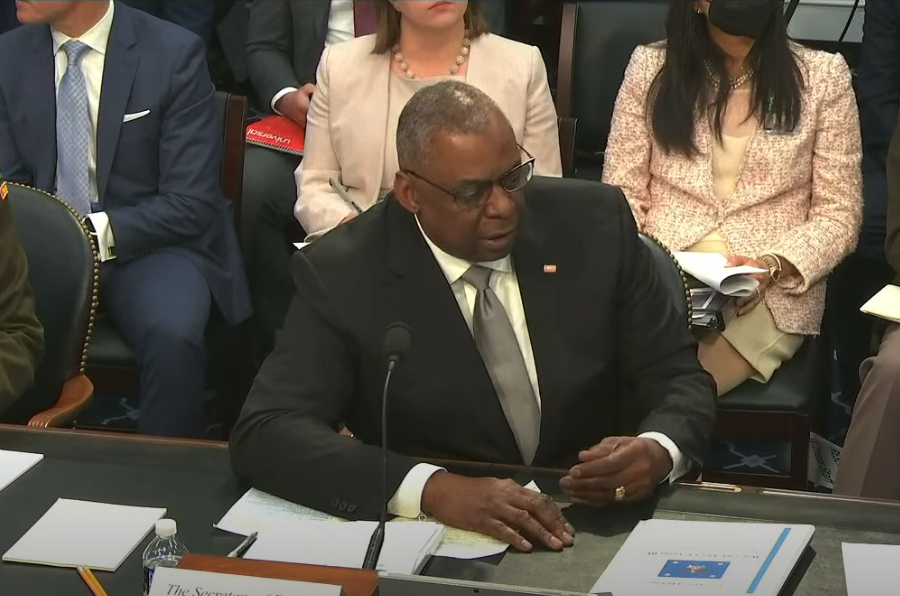A hearing of the House Appropriations defense subcommittee drew attention to perceived funding shortfalls in the U.S. Indo-Pacific strategy, but Defense Secretary Lloyd J. Austin III and Chairman of the Joint Chiefs of Staff Gen. Mark A. Milley said plans to counter China have not been curtailed by the demands to defend NATO and supply weapons to Ukraine.
“Our leadership matters when it comes to Ukraine,” Austin said in his opening statement, citing $4.5 billion in defense assistance to Ukraine since January 2021.
Austin also cited what he referred as the “Contact Group on Ukrainian Security,” which united more than 40 nations for the first time April 26 at Ramstein Air Base, Germany, to coordinate and deliver defense assistance for Ukraine’s war effort against Russia.
Then the defense Secretary quickly pivoted to the department’s stated priority in the recently released classified version of its National Defense Strategy (NDS).
“The department’s pacing challenge remains countering aggression from China,” Austin said, noting $6 billion in the fiscal 2023 budget for the Pacific Deterrence Initiative (PDI). “We’re going to enhance our force posture, our infrastructure, our presence, and our readiness in the Indo-Pacific, including the missile defense of Guam.”
Still, lawmakers who voted to approve another $40 billion supplemental bill for defense assistance to Ukraine the evening before worried that the Ukraine aid was sapping valuable resources away from America’s Pacific threat.
“In my opinion … the need for military power has not decreased, but we’re choosing to try to plug in some gaps with maybe some nonmilitary capabilities,” said Rep. Steve Womack (R-Ark.).
The lawmaker worried that the “unanticipated extraordinary costs” of supporting the Ukraine war effort was impacting “what we’re trying to do in this budget for our biggest pacing threat, which is China.”
Some subcommittee members challenged the budget itself. While the NDS calls for air and sea power to confront China, the budget divests 250 aircraft and two dozen vessels.
“I fail to understand how decommissioning 24 Navy ships, divesting hundreds of aircraft, helps us maintain our strategic combat advantage over these threats,” posed ranking member Rep. Ken Calvert (R-Calif.).
Austin countered that the NDS called for significant investments in the capabilities required to compete with China, namely $27 billion in space, $11 billion in cyber, $24 billion in missile defense and $7 billion in long-range weapons, including $4 billion in hypersonic weapons. He also noted modernization of the nuclear triad and $56 billion for airpower platforms and systems.
Womack said the budget called for no permanent force posture increases to the Pacific, and he wondered if “innovation” and “soft power” were meant to supplant the military effort.
“No. 1, I think we have a very sound strategy,” Austin affirmed. “Getting the capabilities of space and cyberspace integrated into our efforts, I think, is really, really key.”
Austin also pointed to efforts to leverage support from allies and partners and again referred to PDI funding, which he said would be used to increase training rotations and infrastructure in the Pacific.
Milley cited a force presence of some 350,000 troops from the U.S. West Coast to west of the international dateline.
“The strategic main effort for the United States military—that is clearly in the Pacific,” the chairman stated. “Even though we are incurring additional capabilities and investments in what we’re doing with Ukraine, it’s not having a significant negative effect on our ability to keep pace with China.”
President Joe Biden has used his presidential drawdown authority to help Ukraine by drawing from U.S. stocks of weapons such as anti-tank Javelin and anti-air Stinger missiles, diminishing U.S. reserves and worrying lawmakers about America’s own self-defense.
In response, Austin said the defense industrial base is meeting DOD “more than halfway” to ramp up production, and weapon stocks were “about right” for U.S. needs.
The Defense Secretary praised lawmakers for passing the president’s $40 billion supplemental defense bill for Ukraine, which now goes to the Senate for approval. He also committed the U.S. to help with Ukraines’ defense for the foreseeable future.
“We’re doing a lot, and, you know, our allies are doing a lot,” Austin said. “And we’re going to continue to do everything that we can for as long as we can to help them defend their sovereign space.”
